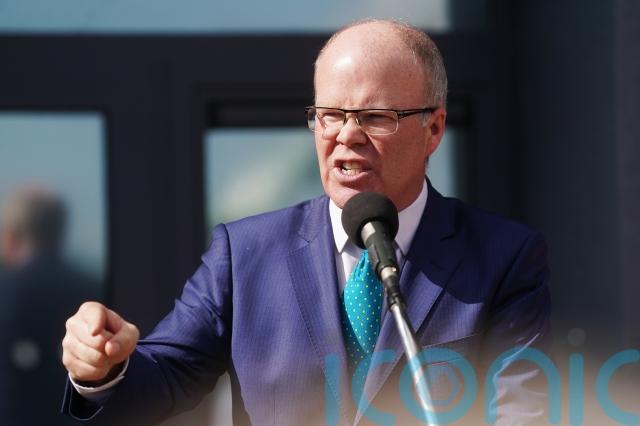
The Taoiseach has defended a decision to “evaluate” how Ireland handled the coronavirus pandemic rather than set up a statutory inquiry.
Simon Harris said that a Covid evaluation will “get to the bottom” of Ireland’s response to the pandemic in a timely way.
Mr Harris, who was the health minister for the first four months of the pandemic, said authorities got a lot of things right but also that people experienced a lot of hurt during the health emergency.
Tanaiste Micheal Martin said that he was looking forward to sharing his reflections of being taoiseach during that period and said he had “no doubt” senior public health figures will voluntarily take part in the probe.
The move to set up an evaluation has been criticised by opposition TDs for not having the power to compel papers and witnesses.
Aontu leader Peadar Toibin said the evaluation “wishy-washy” and called for a full public inquiry, while People Before Profit-Solidarity TD Mick Barry said it was “toothless”.
Anne Scott, a professor emerita with University of Galway whose research interests include the ethics of healthcare, is to lead the evaluation of how the country managed Covid-19.
She holds a BA in philosophy and psychology from Trinity College and a PhD in philosophy from the University of Glasgow, and has worked as a clinician and academic in Ireland, Scotland, Kenya and England.
The Government announced her appointment on Wednesday following a Cabinet meeting where the terms of reference for the evaluation were agreed.
These include a consideration of the health service response covering hospitals, the community and nursing homes, along with the wider economic and social response, including the impact on education and businesses.
Professor Scott is to lead a multi-disciplinary panel with relevant expertise to produce focused recommendations.
Speaking on Thursday, Mr Harris said other non-statutory processes had yielded results in a “very time-efficient way”.

“Ireland got lots of things right during that period of time, but also there was a lot of pain, a lot of hurt, and indeed a lot of loss, including loss of lives during the Covid pandemic,” he added.
“It’s really important that we look back at what went well and we look at what didn’t.
“It’s also important that we look forward in terms of the learnings of that and how that can be applied to future pandemic preparedness. I really want to thank Professor Anne Scott for agreeing to chair the panel.
“I would make this point. We’ve had in the past structures that haven’t been statutory, and they’ve yielded really good progress.
“The one I think of is the (Gabriel) Scally report.
“A very different situation, but you will remember at a time there was serious concern around cervical cancer screening, and we actually set up a process with Professor Gabriel Scally that did provide answers, that did provide a roadmap, and did it in a very time-efficient way.
“We’ve now appointed an independent chair.
“It is for that independent chair to decide how best she and her panel wish to conduct that and, of course, any extra assistance or advice or powers that she believes she needs, of course, Government will absolutely keep an open mind of that.
“What I would say on the Covid evaluation is this – I think there have been many models in the past, statutory and non-statutory, that have gotten to the bottom of things, that have provided answers, that have provided a useful way forward.”
Tanaiste and Minister for Foreign Affairs Micheal Martin said that he has stated before the look-back at Ireland’s response to the rise of Covid-19 should not be done through an “adversarial, legal prism”.
He said he had no doubt that figures such as the former chief medical officer will come forward to take part in the probe.
“They will come forward, I have no doubt about that. It is in the public interest,” he said speaking in Athlone.
“Chief medical officers are very enthusiastic about public health, the issue about the pandemic is it brings public health to the fore to a degree that nothing else ever will.”
He added: “What we need to do is assess how we responded across the various areas, health in particular, the preservation of life, education, childcare, economy, all aspects of our society – how did we respond?
“What lessons did we learn from that? Could we do better the next time in the event of another emergency?
“But we could actually get far more speed this way and if there are any difficulties arising during the course of the inquiry then it falls to a new government to review that.”
He added: “I was the taoiseach during Covid.
“I’ve reflected on all of my experiences as taoiseach during Covid and I’m looking forward to giving those in an objective and partial way for the benefit of future taoisigh.”
Mr Harris added that Prof Scott will be independent in her work, and that the panel will hear from people who wish to be heard.
“I think it’s also really important that the voices and experiences of people impacted by Covid, and some awfully impacted by Covid, are recorded, are heard. I really look forward to a process being put in place to make that happen,” he added.
“We wanted to make sure we made progress in terms of moving this forward ahead of a general election, that was something I felt very strongly about.”
Subscribe or register today to discover more from DonegalLive.ie
Buy the e-paper of the Donegal Democrat, Donegal People's Press, Donegal Post and Inish Times here for instant access to Donegal's premier news titles.
Keep up with the latest news from Donegal with our daily newsletter featuring the most important stories of the day delivered to your inbox every evening at 5pm.